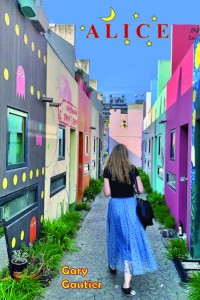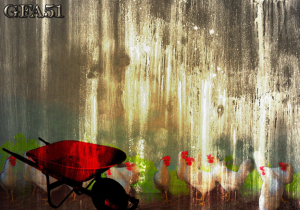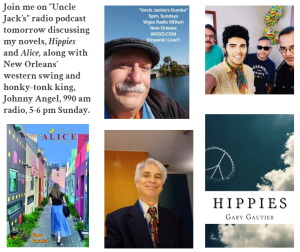* * * Click covers for links * * *
Category Archives: Poetry/Fiction
Cup of dreams
Mapping Simon
Here’s the passage in Alice that follows the full moon gathering.
xxx
“What are you doing?” asked Alice.
Christopher looked up from his task. He was in Alice and Evelyn’s garden, crouched between a row of cabbages and a row of fine hot serrano peppers. Fairies hummed in the not-too-distant woods and ladybugs flitted unobtrusively. Lying in the rut between the rows was Simon, his small deformed body naked to the sun and the sky and the sportive play of bugs. He was face down, but his gargantuan hands, his uneven buttocks and bowling ball head, all indicated restfulness.
“I’m mapping Simon,” Christopher said.
“Look at him,” said Alice. Then she leaned over and kissed Christopher on the lips.
“You have such a way of putting people at ease,” Alice said. “Sometimes I think your thing isn’t mapmaking but putting people at ease.”
Christopher went back to work with his tools and widgets.
“Why are you mapping Simon anyway?” Alice asked.
“John Wilson asked me to,” said Christopher.
Interesting, thought Alice. John Wilson never asked for anyone to be mapped before. He mainly just ran things, walked around and got input from the different New Arcadians, and then ran things some more. Why does he want Christopher to map Simon?
She received a clue to this mystery later that afternoon. Simon had come in and was in a warm bath. Christopher had gone into the room with Evelyn to rub her legs and possibly make love. And TOCK-TOCK-TOCK, John Wilson was at the door.
“Come in, John Wilson,” said Alice. “Why did you want Christopher to map Simon?”
“I don’t trust Simon,” said John Wilson. “Where did he come from and why? No one seems to ask the right questions around here.”
John Wilson seemed irritated, which amused Alice. Of course, he was right. No one knew where Simon had come from or why. It might be good to find these things out.
Later, after Christopher had returned to Freyda the white witch and John Wilson had returned to his live-in wing behind the communal hall, Alice lay in Evelyn’s arms enjoying the night – the smells in the window, the hum of fairies and other sounds of small birds and animals. Simon was sleeping on the box in the corner of the bedroom where she had propped him up. Where was he from? And why was he here? Where was he from? And why was he here? Where was he from?
She must have fallen asleep like her namesake who went through the looking-glass, because soon it wasn’t her asking the two questions, but a figure in the darkest corner of the room, a hooded figure, sitting in an old rocking chair that had come down to Alice from God knows when.
xxx
Ok, that’s enough for now. Just click the cover and buy the book before it’s too late.
* * * Click covers for links * * *
So much depends upon
Image from melo03.wordpress.com/2010/01/13/william-carlos-williams-the-red-wheelbarrow.
so much to say
about
a simple
image
glazed with something
more
despite the old
poet
* * * Click covers for links * * *
Uncle Jack’s discussion
For the radio podcast to go with the image of yesterday’s post per my novels, Hippies and Alice, click HERE. My bit is at 15:30-24:00 😊
* * * Click covers for links * * *
Uncle Jack’s
Cold flower
Alice: The full moon gathering
Here’s another thread in my soon-famous post-apocalyptic adult hippie fairy tale, Alice. Two bits here: one, near the beginning, just after the introduction of the white witch (which you can find here); and the second bit later but still in Chapter 1, where the thread picks up at the full moon gathering.
xxxxxxx
“Evelyn,” said Christopher. “Do you want me to rub aloe vera on your legs?”
“No,” said Evelyn. “I want you to go to the pond with Alice. She wants to show you something.”
Evelyn went back to the sangria, and Alice and Christopher walked to the pond. When they got there, they took off all their clothes, jumped in, and then lay naked on the bank in the sun for a moment.
“I forgot to cut the oranges,” said Christopher.
“It’s OK,” said Alice.
“What did you want to show me?” asked Christopher.
“The bushes there,” said Alice.
Christopher looked in the direction of Alice’s gesture.
“That bush in particular. That’s where I saw the thing move. That’s where the hum of the fairies stopped. I think it had something to do with the change in the cosmos.”
“Hmm,” said Christopher. “That’s interesting.”
“Maybe you should make a map of it,” said Alice. Christopher, as everyone knows, was the mapmaker.
She squeezed water from her brown curls. Christopher leaned over and kissed her. She liked it when he did that. Christopher had nice lips.
“There it is again,” she said.
The bushes rattled but the hum didn’t stop this time.
“Maybe they’re getting used to it,” said Alice.
A white bald head stuck up out of the bush. Youthful it looked, or timeless, but definitely white and bald.
“Hello,” said Alice.
Nothing said the head.
“Hello,” said Christopher.
Still nothing.
“We’d better take care of it,” said Alice. “It looks hurt.”
* * *
Simon was the creature’s name. He wrote it down for Alice. Apparently, he could not speak. Maybe he was too weak to speak. Maybe he was born that way. His bald head shone like a bowling ball. The presence of fairies would always make him weep. Even if Alice and Evelyn did not know that fairies were near, Simon would know, and then Alice and Evelyn would know, because Simon would quietly start to weep.
John Wilson was supervising the hanging of the streamers – purple, green, and gaudy gold – in the communal hall of New Arcadia. Tonight was the full moon gathering. It was no surprise then that the full moon shone over the tips of the pines just outside of the hall. The rain king, a senile old fellow with a long white beard and an important ceremonial function in New Arcadia that no one could remember, was already there, perched in a wooden chair at a wooden table.
So the cooks cooked, the servers served, and the tablers laid the tables both outside and inside the hall. Mostly outside, as the smell of fresh pine and new sage would keep many a guest under the moon.
Along came Christopher the mapmaker and Freyda the white witch, Lonnie the kleptomaniac, and Alice and Evelyn and Simon. Alice and Evelyn brought the sangria, which was normally the big attraction, but this month every eye was fixed on Simon. Life was pleasant in New Arcadia, but news was hard to come by, and Simon was news.
Everyone started with sangria, and it was nice for everyone to see everyone else. After a few glasses, Evelyn stretched out in the moonlit grass so Christopher could rub palm seed oil on her long legs, the legs he would map someday. Freyda and Alice ate spinach pinwheels and swapped thoughts about the constellations and the spheres. But Lonnie the kleptomaniac kept her eye on Simon.
Lonnie the kleptomaniac had grown up in a cabin in no way extraordinary, unless it was extraordinarily ordinary. Like everyone in New Arcadia, they had had lots of vegetables, sufficient heat, sufficient cool, sufficient space, and a green field filled with gigantic toys for the kids to play in. No one knew why Lonnie became a kleptomaniac. Private property was not even really a thing. Sure, people had their own stuff in their houses, their kitchens, their living rooms. But things swapped around a lot. If the white witch needed something the rain king had, the rain king would say, “Take it,” and he knew he could find it at the white witch’s house. If Alice needed something Christopher had, Christopher would say, “Take it,” etc. What was the point of being a kleptomaniac with such an arrangement? There was no point, but that was Lonnie’s thing. She would not ask anyone, and no one would say, “Take it.” She would just take things secretly, so you never knew they were gone until you were looking for them. Sure, it was annoying sometimes, but that’s how Lonnie was and what could you do about it. One thing you couldn’t do was get mad at her because she had a smile as sweet as Alice. Her eyes set deep in her narrow face were sharp and beady, her hair straight black, her body all points and angles, but her smile, her smile, her smile as sweet as Alice.
So here Lonnie sat looking at the monstrous head of the little creature who came as the news. “I’d like to steal that head,” she thought to herself. “When no one is looking, of course.”
Lonnie walked over to Simon, who dribbled a little as he sipped his sangria. Sure, his head looked like a shiny bowling ball from the back, but from the front he had a heavy brow and a surprisingly long face. His hands, unlike the heart of the infamous Grinch, were two sizes too large. He apparently could not speak, but his sagging mouth revealed a pointy tongue with dots like squid suckers all over it. Lonnie loved everything about him. She talked soothingly to him while he gazed back up at her; she unwrapped his shawl and rubbed his shoulders; she stroked and kissed his beautiful bowling ball head.
But someone WAS looking. John Wilson, who made no maps and had no interest in Evelyn’s legs, who neither saw mysterious changes in the starry constellations nor heard the music of the spheres, had stayed inside the communal hall. John Wilson, who in his no-nonsense way kept things together and put a check to anything that made waves, saw Lonnie the kleptomaniac plant those peach-slice lips on the bowling ball head. And at this moment, he, John Wilson, realized the unrealizable. He, the organizer, the manager, the one who keeps the calm in the storm, he, John Wilson, was in love with his nemesis, the disorganizer, the one and only wave ruffler in New Arcadia, Lonnie the kleptomaniac.
* * * Click covers below for links * * *
The Clown and the Tiger
I earlier sampled the first story from my forthcoming book, Two Dreams and Two Hollows. Here, I’ll sample the opening of the second story — enough to feel the style, the staccato structure, the apparent randomness of the story’s universe …
Opening segment of “The Clown and the Tiger.”
“That’s water-turned-wine,” said Jane, archly but without a trace of impatience. “Your turn.”
I pulled two cards from the top of the deck and studied them. Far away, goats’ bells ding, and still further out, glimpsed between the gnarled crosses of olive trees tumbling down the rugged hillside, lies the expansive, dark blue Mediterranean. Two white chickens, boisterous, nearer to the scene, patrol Spiro’s patio. Unripe grapes hang, lemony waxen bath beads, above our heads. Time passes. Giovanni deals the cards, suffers a poor draw.
One must not forget: the sun is to be worshipped here. We fill an empty bottle with local wine, swim, and prostrate ourselves before said deity, naked like stones in the sand. A hoary old Greek raises a piece of driftwood shaped like the arm of Achilles and heaves it with great show of violence into the sea; he stares straight at me with a look of wild relief, laughs, spits, and disappears down the east beach.
I jump when awakened. It is one of my traits. This time, I am awakened at Lake Travis, Austin. Years seem to have passed. Jane is naked, shorter than average but perfect in form, waist deep in water. The tips of her hair, long, brown, silky, dip the water. Her solid brown eyes, soft but alert to every modulation in the visual universe, observe, assess, and disregard two kids wading toward her. I lay back and close my eyes at the sun, as Jeff sits up and says something about chili rellenos. I hear the kids shriek and plunge. A stout woman screams something in Spanish. I open my eyes. The beach is deserted save for them and us.
On the way home I know Jeff is about to speak by the way he rubs the swarthy stubble on his jowls, making the pint-sized popeye tattoo on his upper arm seem to rise from the dead and then die again with each stroke. He pats his paunch thoughtfully, the face tensing slightly under the massive crown of black locks until it achieves an expression that might have become Humpty Dumpty just before the fall. “Katie is in trouble,” he says. “She needs to move in with us.”
We find Katie and Alissa, her four-year-old, in the front yard studying a caterpillar. Alissa has Katie’s narrow chin and high cheekbones. One can already see her life unfolding through the features. The caterpillar reminds Jeff of a story. Once he had waited for months for a cocoon to open. He had pictured the fuzzball breaking open like a pomegranate. But eventually he forgot about it. Then one day he was playing in the yard and heard a little scratching sound. He turned and saw the cocoon just beginning to tear. And do you know what came out of that cocoon?
“What?”
“A TIGER. RAAAAAAAAAAAAAA.”
“No,” said Alissa. “A butterfly.”
xxxx
Here’s a tentative book cover:
* * * Click covers below for links to my other books * * *
Alice free now
FREE instant download for the next few days. A post-apocalyptic adult hippie fairy tale by two-time Faulkner-Wisdom Prize finalist, Gary Gautier.
Get it HERE while it’s free. Read it later. Tell your friends.
#1 Bestseller on Amazon’s Metaphysical Fiction (free) list
#2 Bestseller on Amazon’s Literary Fiction (free) list
* * * Click covers for links * * *












